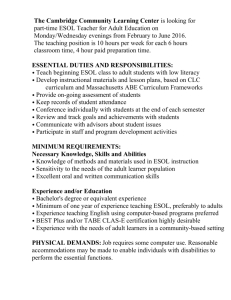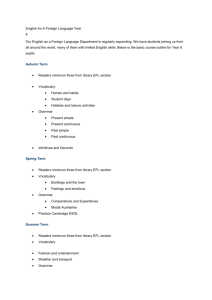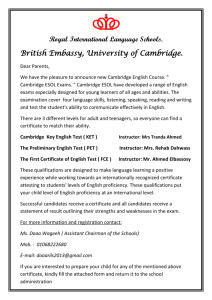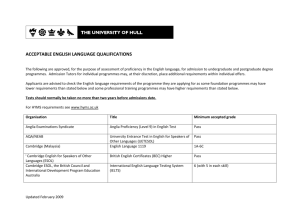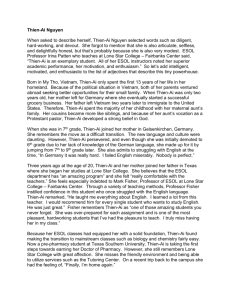DRAFT DRAFT DRAFT - Cambridge Community Foundation
advertisement
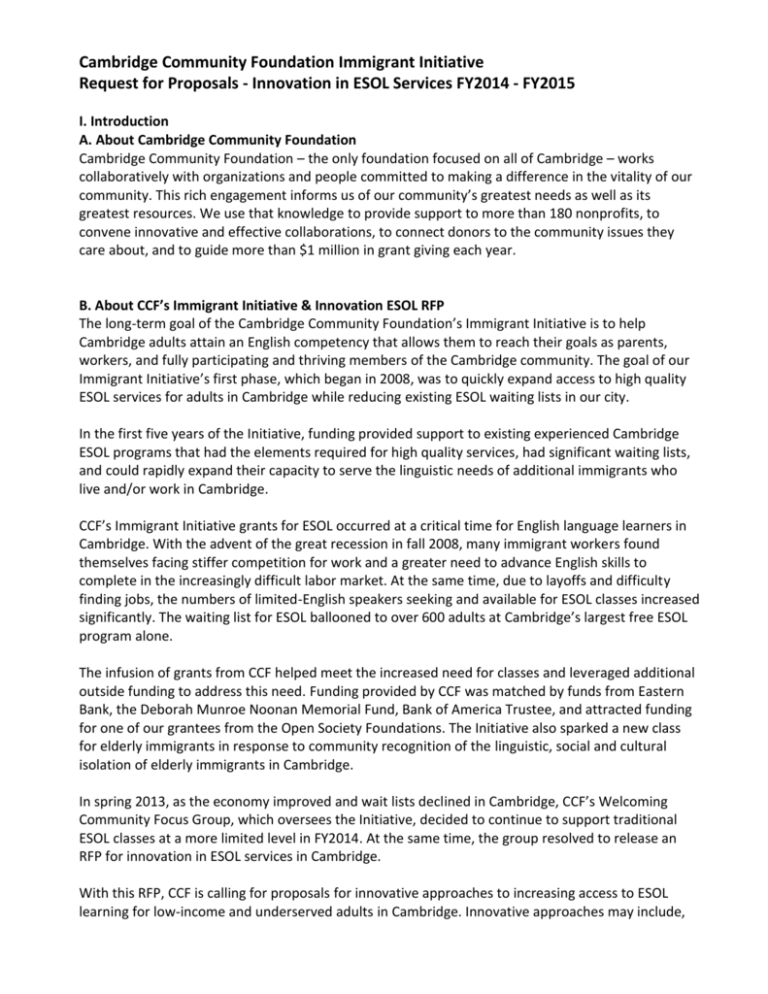
Cambridge Community Foundation Immigrant Initiative Request for Proposals - Innovation in ESOL Services FY2014 - FY2015 I. Introduction A. About Cambridge Community Foundation Cambridge Community Foundation – the only foundation focused on all of Cambridge – works collaboratively with organizations and people committed to making a difference in the vitality of our community. This rich engagement informs us of our community’s greatest needs as well as its greatest resources. We use that knowledge to provide support to more than 180 nonprofits, to convene innovative and effective collaborations, to connect donors to the community issues they care about, and to guide more than $1 million in grant giving each year. B. About CCF’s Immigrant Initiative & Innovation ESOL RFP The long-term goal of the Cambridge Community Foundation’s Immigrant Initiative is to help Cambridge adults attain an English competency that allows them to reach their goals as parents, workers, and fully participating and thriving members of the Cambridge community. The goal of our Immigrant Initiative’s first phase, which began in 2008, was to quickly expand access to high quality ESOL services for adults in Cambridge while reducing existing ESOL waiting lists in our city. In the first five years of the Initiative, funding provided support to existing experienced Cambridge ESOL programs that had the elements required for high quality services, had significant waiting lists, and could rapidly expand their capacity to serve the linguistic needs of additional immigrants who live and/or work in Cambridge. CCF’s Immigrant Initiative grants for ESOL occurred at a critical time for English language learners in Cambridge. With the advent of the great recession in fall 2008, many immigrant workers found themselves facing stiffer competition for work and a greater need to advance English skills to complete in the increasingly difficult labor market. At the same time, due to layoffs and difficulty finding jobs, the numbers of limited-English speakers seeking and available for ESOL classes increased significantly. The waiting list for ESOL ballooned to over 600 adults at Cambridge’s largest free ESOL program alone. The infusion of grants from CCF helped meet the increased need for classes and leveraged additional outside funding to address this need. Funding provided by CCF was matched by funds from Eastern Bank, the Deborah Munroe Noonan Memorial Fund, Bank of America Trustee, and attracted funding for one of our grantees from the Open Society Foundations. The Initiative also sparked a new class for elderly immigrants in response to community recognition of the linguistic, social and cultural isolation of elderly immigrants in Cambridge. In spring 2013, as the economy improved and wait lists declined in Cambridge, CCF’s Welcoming Community Focus Group, which oversees the Initiative, decided to continue to support traditional ESOL classes at a more limited level in FY2014. At the same time, the group resolved to release an RFP for innovation in ESOL services in Cambridge. With this RFP, CCF is calling for proposals for innovative approaches to increasing access to ESOL learning for low-income and underserved adults in Cambridge. Innovative approaches may include, but are not limited to: distance learning (which may include dual distance/traditional learning); programming that utilizes new technology; programming that expands the use of volunteers that will enhance student success; programming that reaches adults not currently being reached due to scheduling, cultural, or other barriers; or ESOL instruction linked with vocational training, entrepreneurship development, financial literacy or other skills, to name just a few approaches to innovation. A priority is to reach low income and/or underserved adults who reside or work in Cambridge and to expand these individuals’ ability to fully participate in the economic, educational, and civic life of the Cambridge community. II. Description of FY2014 Innovation Grant Funding A. Basic Information Through a competitive proposal process, CCF is making available up to $30,000 per year for two years to support an innovative approach to increasing access to effective ESOL instruction in Cambridge. Applicants must demonstrate successful experience in providing high quality ESOL services prior to this application or be partnering with an organization that has had such experience. The maximum grant size is $30,000 per year or $60,000 for two years. (On the budget pages, you will be asked to list any matching funds that will be used to augment a CCF grant.) Programs receiving grants from other CCF funding pools may also apply for a grant under this RFP. For the purposes of this proposal, the fiscal year is July 1 through June 30. Your proposal should set out a plan for two years of funding. During the first year, grantees may utilize grant funds for planning between October-December 2013 but are not required to do so. Programs should provide direct services starting no later than January 2014. Funding in the second year will be contingent upon successful completion of the first year of programming. Collaboration and partnerships are encouraged (though not required), especially if it will enhance your agency’s ability to reach an under-served population. Organizations that work with immigrant populations but have limited experience providing ESOL are required to partner with an organization that has demonstrated success in high quality ESOL service delivery in order to apply. If collaboration is a central component of your proposal, please include a memorandum of understanding between the collaborating agencies as an additional attachment to your proposal. B. Project Requirements The funded organization will increase the number of low-income adults who live and/or work in Cambridge who are served by high quality ESOL programs. The organization will meet an unmet need in ESOL that they have identified among adults who live and/or work in Cambridge (i.e. the organization will provide ESOL services that would not be provided without this grant). The proposed program will implement an innovative approach to ESOL programming. 2 Services under this grant must be offered free or at low cost. If your program will charge a fee, please include the rationale. Organization must have 501(c)(3) status or a fiscal sponsor with that status. Please explain how you will offer instructional intensity sufficient to allow for significant student progress. If your program will offer fewer than five classroom hours of instruction a week, or less than 12 week teaching cycles, please explain why you will do so , what the average amount of time on task per individual served will be per week, and how you will measure intensity. Grant funds must support services for adults who live and/or work in Cambridge, MA. There is a strong preference that instruction held as a result of this funding be conducted in Cambridge. The funded program is expected to participate in evaluation of their project. In managing your finances, your program is expected to follow standard accounting practices. III. Submission Information Your proposal and report must be received at the CCF office, 99 Bishop Allen Drive, Cambridge, MA 02139 by 5:00 p.m. on Friday, September 13, 2013. An original plus 5 hard copies of the proposal are required. Please see the Proposal Checklist for details. In addition to the hard copies of your proposal, an electronic copy of your proposal must be emailed to proposals@cambridgecf.org by 5 p.m. on Friday September 13, 2013 The maximum proposal narrative length is twelve pages, not counting the CCF Proposal Summary, the Budget Form, and any attachments. Up to 5 pages of unsolicited attachments are welcome. Two copies are sufficient. Funding Decision Timeline o Friday September 13, 2013 at 5 PM – proposal is due o Late September, 2013 - grant award finalized and grantee notified o October 2013 - Program start-up IV. Proposal Format A. CCF Proposal Summary Sheet Please complete the attached CCF Proposal Summary Sheet in its entirety, including information on other funding sources for this project. The summary sheet should not exceed one page. 3 B. Narrative Sections The proposal narrative section should not exceed 12 pages, including summary of staff qualifications and board list. 1. Program and Organization Information Briefly describe the services your agency or organization offers. State your agency or organization’s experience in providing high quality ESOL services. Please be specific regarding the success you have had in meeting program standards of the funders for these classes. Please note your experience providing services in Cambridge or to Cambridge residents. Briefly state your agency or organization’s key accomplishments, including learner achievements, in the past year. 2. Statement of Need Demonstrate that the services you propose address a specific ESOL need in Cambridge by providing the following information. Summarize your proposed learners’ demographic characteristics, including first languages, countries of origin, ages, educational and ethnic backgrounds, and neighborhoods of residence in Cambridge. What % of the students will be low income? Describe your learners’ needs and interests. If you have identified a level of ESOL that you expect to serve with this grant, tell us what level. Document how your program will address the needs of a population of learners that are not currently being met. For example, does your program have a long waiting list of adults who live or work in Cambridge? Are there particular types of ESOL needs that are not being met, or particular populations of learners whose needs are not being met that you will serve? Please briefly describe the rationale of the proposed project in relation to the need. State how your proposed instructional hours will conform to the daily schedules of the learners you plan to serve. How did you arrive at your approach to meeting this need? Who participated in your process of determining need? What was the input from adult learners, your staff and any other stakeholders or community members? How will your innovation positively affect the capacity, efficiency and/or scope of the ESOL network in Cambridge? 3. Project Description In responding to all questions of parts 1, 2, and 3 below, explain what your project will do if it 4 receives the support you are requesting. a. Project Goals, Activities and Timeline Overview What are your overall goals for this project? What are the more specific objectives for this project, including objectives for students in this project? What are the outcomes you propose to achieve? How will you measure your success? What is innovative about your approach? What experience do you have that leads you to believe that your innovative approach will be successful in meeting the need? Have you previously implemented a similar program and if so what were the results? Give an overview of your proposed activities as they pertain to your goals and objectives. If you include a planning period, please include activities of the planning process. How many people will be served by the program each year, how intensive will the services be and how long will students receive services under this grant (include hours per week and weeks per year)? How does this level of intensity reflect effective practice in ESOL for the population you will serve? Please discuss your capacity to retain students for sufficient time to allow significant language acquisition. Briefly state your timeline. If you will include a planning phase, please be clear about its duration and when instructional programming will begin. b. Project Methods Discuss your proposed project’s methods regarding: outreach and recruiting: please describe how you will recruit students from your target group; intake and initial assessment of learners’ educational level and needs, detailing how you will assure that students participating in the proposed ESOL innovation program have or gain sufficient skills to successfully participate in the program; teaching approach/es, methods, curriculum and materials. Be sure to include any special features of this particular project that are different from other ESOL classes that you offer; approach to learner participation and leadership development; methods for encouraging student retention; 5 processes for identifying learner goals and for assessing progress toward those goals; ways of assessing individual progress in language proficiency; provision of counseling and referral, including helping learners take next steps once their educational goals are achieved. Who will be responsible for counseling services? If your program will use technology for instruction, how will you use it? What is your experience using this technology as an instructional tool and how successful has it been? program administration and governance. How does the proposed project fit in your organizational mission and structure and what kind of administrative and programmatic support will this program receive? c. Project Evaluation The organization’s willingness and ability to track students and account for outcomes is important to us. If you receive a grant, we will refer to this section of your proposal in our site visit and reviews of your progress. Programs receiving grants should collect information on individual and aggregate learner demographic characteristics and progress, as well as daily attendance/participation and retention rates. Learners’ progress in achieving their goals and in acquiring English language skills is a required criterion for evaluating program effectiveness. As we review program performance, we will look for improvement in learners’ English and other outcomes you and your students have set. We encourage teachers to help students define individual as well as group learning goals. Please tell us: How will you evaluate your attainment of the stated goals and objectives of this project; what is your evaluation plan? Describe the tools, processes, and people involved in evaluation. Will this project utilize the same assessments as other ESOL programs you offer? Why or why not, and if they differ how will they differ? Discuss your ability to collect student data on residency, enrollments, attendance/participation, ESOL gains, completions, number of terminations and the reasons for terminations. d. Staffing Who will be responsible for your proposed activities? Please include key staff qualifications and a summary of major job responsibilities in the narrative. If a position is vacant, please describe your plans for hiring and supervising the new staff. How will you address staff development in your program? 6 Are your staff and Board/Council representative of the community you are serving? e. Collaboration and Support What other organizations do you currently collaborate with to help ESOL students access basic services, support their children’s education, advance educationally and in the workforce, and participate in civic life? If you are proposing a new or expanded collaboration, how will this strengthen your program? f. Challenges What are the challenges you anticipate in implementing this project and how will you address them? g. Funding Contingency If you were to receive partial funding, would you still be able to operate this program and, if so, what changes would you make? h. Your Board List Please include at the very end of the narrative a list of your board of directors noting town of residence and number of years on your board. C. Proposed Project Budget and Budget Narrative You may use the attached CCF Budget Form, or a similar format that includes the requested information. If you use our form, please fill in the purple sections and enter figures in columns with red headings. Administrative overhead may be entered on an “Other” row. You will note that in column C, you need only fill in the amount you are requesting from CCF (cell C15) and it will automatically feed that amount into several other places. Be sure to fill out both Year 1 and Year 2 budget pages. If you use your own forms, please be sure to submit both your program budget and your agency budget for two years. (You may provide these on separate pages if you prefer.) The total costs of the project budget should be reasonable and well explained. Please include in the notes the planned pay rates and hours for project staff including contracted staff (for example Instructor at $22/per hr. x 9 hrs/week x 38 weeks = $7,524). Please also list in the notes other private or public funding sources for the project, noting monies that have been (R) requested and (CR) committed/received. V. Site Visits and Reporting The reporting requirement consists of at least one site visit each year, one report at the end of the 1st year prior to approval of the 2nd year of funding, and again at the end of the 2nd year. During a site visit, CCF will review progress of the project and will observe instruction in spring 2014. Some quantitative data will be requested at the site visit. 7 VI. Proposal Check List Agencies or organizations must submit An original (clearly marked) plus 5 hard copies of the full proposal (see below). The original should not be stapled. The copies should be stapled. 1 copy of your most recent audited financial statements. 1 copy of your tax exempt letter 1 copy of your most recently available year-to-date agency financial statement (Income and Expense Statement and Balance Sheet). An electronic copy of your complete proposal (see below) must also be emailed to proposals@cambridgecf.org by 5 p.m. on Friday September 13, 2013. The original and each copy of the proposal must include the following: A signed CCF Proposal Summary Sheet for this initiative attached as the first page of the proposal (1 page maximum). Proposal narrative (12 pages maximum, including the summary of staff qualifications and list of agency’s board of directors, which are included as part of the narrative). CCF Budget forms or similar budget forms showing both project and agency budgets for 2 years For questions about these guidelines, please contact Bob Hurlbut at 617-576-9966 or by email at rhurlbut@cambridgecf.org. Please see the next page for the Summary Sheet form. 8 CAMBRIDGE COMMUNITY FOUNDATION Proposal Summary Sheet Innovation ESOL FY2014 - FY2015 Date of application: Grant period: to Legal name of organization: Address: Telephone: Website: Organization executive’s name: Executive email: Contact person for this proposal: Title: Contact email: Contact phone #: 501 (c)(3) (yes/no): If not, fiscal sponsor name: EIN#: Fiscal year end: Total agency budget FY2014: Name of program for which you are requesting a grant: Brief summary of the program, including what is innovative about your program: Describe the population this grant will serve (include age groups, racial or ethnic groups): ESOL level: Any special curriculum focus? Number of classes/groups you will provide with this grant Yr. 1_____ Year 2?_____ Class/group size _______ Where and when will this program happen (hours per week and weeks per year) in Year 1? Year 2? What will be the outcomes? Total cost of program Year 1: Year 2: Amount of request Year 1: Year 2: # of ESOL students you will serve with this grant Yr. 1? Yr. 2? What % under this grant will be Cambridge residents? What % under this grant will be people who work in Cambridge but do not live in Cambridge? What % of these do you project will be low-to-mid income and how will you know? # of ESOL students your agency served this past year: How many people are currently on your ESOL waiting list? ________ & # of these from Cambridge*, if known: ______ I certify that my organization’s nonprofit status is current. _____________________________________ (signature) Name of signatory (print or type): INCLUDE this FORM as the FIRST PAGE of YOUR PROPOSAL *live or work in Cambridge 9

